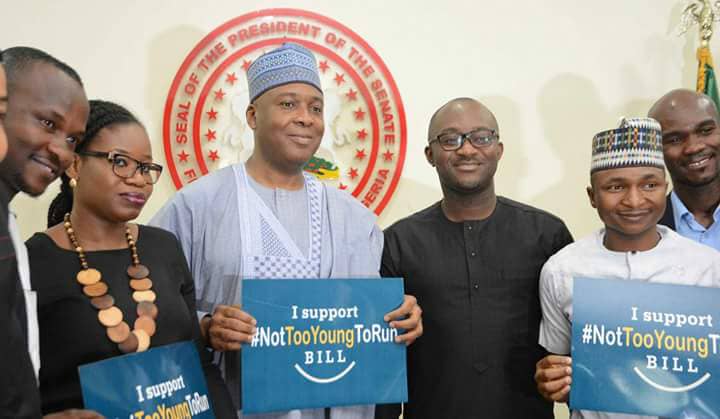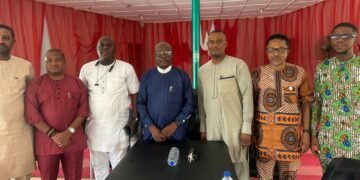Nigeria democracy recorded a historical and landmark victory on Thursday with the assent to the much celebrated and agitated Not too Young to Run Bill, ten months after the Senate took the historical and bold step to pass it into law.
It would not be out of place to say since Nigeria returned to democratic government in 1999, no bill has had this high level of impression and received so much attention like the just assented Not Too Young to Run Bill and no Senate has been so effective and efficient like the present Senate. This is not unconnected with the fact that it is a bill that directly affects the majority of the populace, the youths who make up about 60% of the total population of the nation.
The Bill is an amendment of Section 65 (1), 106(b), 131 (b), 177 (b) of the constitution. Prior to the amendment, the Constitution required that anyone vying for a seat at the National Assembly must attain the age of 35 years for Senate and 30 years for House of Representatives; section 106 (b) stipulated that a candidate must attain the age of 30yrs before contesting for a seat at the state House of Assembly; Section 131 (b) pegged the age of 40 years for candidates vying for the office of the President; while Section 177(b) pegged Age of governorship candidates as for 35 years.
From this, it is clear that the Nigerian constitution was deliberately configured to disenfranchise the majority of the population, who are the youths from age 18 to 28 years from seeking political office at their prime, which is why many take solace in serving as political errand boys.
With the amendment, age of a Presidential aspirant has been reduced from 40 years to 30 years; Governors have been reduced from 35 years to 30 years; Senate from 35 years to 30 years; House of Representatives from 30 years to 25 years; and House of Assembly which was hitherto at 30 years has been reduced to 25 years.
Kudos must be given to the present Senate under the leadership of Senator Bukola Saraki for daring all odds and listening to the voice of reasoning to lift the barrier that has cut off so many young people with intellect, vigour and passion to advance the course of the nation through public elective office.
It would be recalled that the bill, which was finally signed into law in Thursday by the President after so much appeal and advocacy by Civil Society Organisations, and other youth groups across the nation, was passed into law ten months ago, July 2017. The Senate’s passage of the Bill gave it the needed fillip to move forward and see the light of the day, it could have been killed on arrival at the Senate if the Senate is not truly committed to its success.
The Nigerian Senate demonstrated a high level of responsibility and commitment to the inclusion of a very crucial segment of the nation’s population in Democratic governance and not the popular use as political thugs and attack dogs.
It is also a huge demonstration that the present Senate led by Saraki is truly committed to youth development and not just mouthing the commitment. It is walking the talk. And this is evident with the high number of young appointees working as aides to the Senate President.
President of the Senate, Bukola Saraki, was also quoted to have said that the passage and assent to the #NotTooYoungToRun Bill, will be the first phase in the journey for more youth inclusion in politics. Advising the youths “to use same energy that you applied to the ‘Not Too Young to Run’, to push for free and fair elections. When you have the voice, you have the numbers.”
While we continue to give lots of accolades to the Senate President and the Senate for the removal of the major barrier serving as impediment to youths inclusion in governance, the ball is now in the court of the young people to fully take charge of this bill to their advantage













